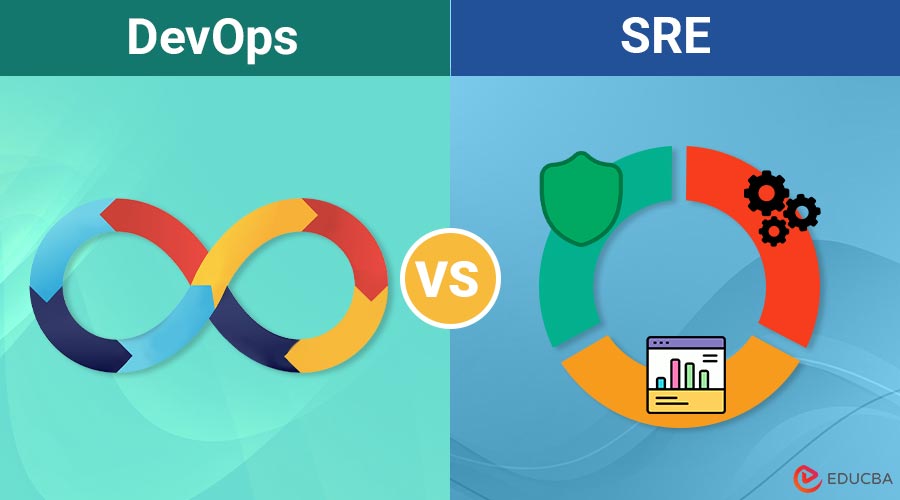DevOps vs SRE | Understanding Core Differences Clearly



Introduction
In the ever-evolving world of software development and IT operations, two terms often dominate discussions: DevOps and Site Reliability Engineering (SRE). While both share the goal of bridging the gap between development and operations, they approach the problem in different ways. Organizations often struggle to decide whether to adopt a DevOps culture, implement SRE practices, or combine both. This blog offers a detailed comparison of DevOps vs SRE, examining their definitions, principles, benefits, key differences, and use cases to help you make an informed choice.
Table of Contents:
What is DevOps?
DevOps is cultural and technical movement that integrates software development (Dev) with IT operations (Ops). Its principal objective is to shorten the development lifecycle, increase deployment frequency, and deliver reliable, high-quality software.
Key Principles of DevOps:
- Collaboration – Developers and operations teams work together instead of in silos.
- Automation – Processes such as CI/CD pipelines, testing, and deployments are automated.
- Continuous Integration & Continuous Delivery – Ensures fast and frequent releases.
- Monitoring & Feedback – Constant monitoring for performance improvements and customer feedback.
- Cultural Shift – Focuses on breaking barriers between teams and fostering shared responsibility.
What is SRE?
Site Reliability Engineering (SRE) originated at Google in the early 2000s as a discipline that applies software engineering principles to IT operations and infrastructure. Unlike DevOps, which is more of a cultural movement, SRE is an implementation framework with measurable metrics.
Key Principles of SRE:
- Service Level Objectives & Service Level Agreements – Define and measure reliability.
- Error Budgets – Strike a balance between innovation and reliability by allowing a certain level of risk.
- Automation over Toil – Reduce repetitive manual tasks through automation.
- Monitoring & Incident Response – Proactive problem-solving and quick recovery.
- Engineering Mindset – Operations tasks are treated as software engineering problems.
Key Differences Between DevOps and SRE
Here are the key differences between DevOps and SRE presented in a structured comparison table.
| Feature | DevOps | SRE |
| Definition | A cultural movement that integrates development and operations. | A set of practices and roles that apply engineering to operations for reliability. |
| Focus Area | Collaboration, speed, automation, and delivery. | Reliability, stability, and performance of services. |
| Approach | Philosophy and cultural shift. | Prescriptive framework with defined practices. |
| Primary Goal | Faster development cycles and continuous delivery. | Reliable systems with minimal downtime. |
| Metrics | Deployment frequency, lead time, and recovery speed. | SLIs, SLOs, SLAs, and error budgets. |
| Role | DevOps engineers work across development and operations. | SREs are engineers with deep ops + coding expertise. |
| Automation | CI/CD pipelines, testing, and infrastructure as code. | Automating incident response, monitoring, and scaling. |
| Ownership | Shared responsibility across teams | Strong emphasis on service reliability and ownership. |
| Origin | Industry-driven cultural shift. | Google-created engineering discipline. |
Pros and Cons of DevOps and SRE
Here are the pros and cons of adopting DevOps and SRE practices for modern organizations.
DevOps Pros:
- Accelerates software delivery – DevOps integrates development and operations, enabling faster deployments, reducing bottlenecks, and accelerating software release cycles for organizations.
- Strong cultural transformation – DevOps promotes collaboration, communication, and shared responsibility across teams, fostering a culture of trust, accountability, and continuous improvement.
- Encourages innovation and experimentation – By shortening feedback loops, DevOps enables teams to experiment freely, innovate quickly, and respond faster to user needs.
- Broad adoption across industries – DevOps practices are widely adopted across multiple industries, demonstrating their effectiveness in enhancing efficiency, agility, and organizational performance.
DevOps Cons:
- If not balanced with dependability, it might result in burnout. – Excessive focus on speed without reliability considerations may cause team burnout, stress, and operational instability.
- Hard to measure success beyond faster delivery – While delivery speed is measurable, tracking cultural change, quality improvements, or business outcomes remains significantly more challenging.
- Toolchain complexity: Makes integration difficult, costly, and hard to standardize across organizations.
- Resistance to cultural change – Shifting to a DevOps mindset requires breaking silos and fostering collaboration, which many organizations struggle to achieve.
SRE Pros:
- Clear, measurable reliability goals – SRE uses service level indicators, objectives, and agreements to establish quantifiable targets for reliability and service performance.
- Strong engineering discipline for ops – SRE emphasizes automation, coding, and engineering practices to make operations scalable, efficient, and sustainable in production environments.
- Reduces downtime and improves customer trust – By proactively managing failures, SRE minimizes downtime, increases system resilience, and builds long-term trust with customers.
- Balance between innovation and reliability with error budgets – Error budgets help maintain innovation speed while ensuring reliability thresholds are respected and customer satisfaction remains intact.
SRE Cons:
- Requires highly skilled engineers with coding– SRE demands engineers trained in both software development and operations, creating challenges in hiring qualified talent.
- More complex to implement than DevOps – Establishing SRE practices requires sophisticated tooling, organizational changes, and advanced processes, making implementation difficult for many companies.
- May slow down releases if reliability goals are strict – Strict service level objectives can delay deployments, prioritizing stability and reliability over rapid feature releases.
- High initial investment in tooling and infrastructure – Implementing SRE needs costly monitoring, automation, and observability tools, posing challenges for budget-limited organizations.
Real World Examples
Here are some real-world examples showcasing how organizations apply DevOps, SRE, or a combination of both.
1. Example of DevOps in Action
Netflix – Utilizes DevOps practices such as CI/CD, microservices, and chaos engineering to deliver updates rapidly while ensuring a seamless user experience.
2. Example of SRE in Action
Google – The birthplace of SRE, where error budgets and SLIs/SLOs guide every release. Google ensures that its services, such as Gmail and Search, maintain near-perfect reliability.
3. Example of Combined Approach
Amazon – Uses DevOps for agile delivery and SRE for ensuring reliability at scale. Their teams release updates frequently while maintaining high availability of AWS services.
When Should You Choose DevOps and SRE?
Here are practical scenarios to help you decide whether DevOps, SRE, or both are the best fit for your organization’s needs.
Choose DevOps if:
- Your organization is transitioning from traditional IT to modern development practices.
- You want faster time-to-market and frequent releases.
- Your primary challenge is siloed teams and poor collaboration.
Choose SRE if:
- Reliability and uptime are critical (e.g., banking, healthcare, e-commerce).
- You already have a mature DevOps culture, but you need to improve operational reliability.
- You want data-driven incident response and measurable service levels.
Final Thoughts – DevOps vs SRE
The DevOps vs SRE debate is about complementing, not competing. DevOps fosters collaboration, automation, and speed, while SRE ensures reliability, stability, and measurable outcomes. Modern organizations should adopt DevOps as a cultural foundation and SRE as an engineering framework. Together, they enable agility, reliability, and high-quality software delivery at scale, ensuring customer satisfaction and competitive advantage.
Frequently Asked Questions (FAQs)
Q1. Is SRE just another form of DevOps?
Answer: No. DevOps is a cultural movement, while SRE is an engineering discipline with prescriptive practices.
Q2. Do all companies need SRE?
Answer: Not necessarily. Small startups may start with DevOps and later introduce SRE as systems scale.
Q3. What skills are needed for SRE?
Answer: Strong coding, automation, monitoring, incident management, and systems engineering expertise.
Q4. Which is better for career growth: DevOps or SRE?
Answer: Both are in demand. DevOps offers broader adoption, while SRE provides niche, high-paying roles in large-scale systems.
Recommended Articles
We hope that this EDUCBA information on “DevOps vs SRE” was beneficial to you. You can view EDUCBA’s recommended articles for more information.
- DevSecOps vs DevOps
- OpenStack vs VMware
- Agile vs DevOps
- ITIL vs DevOps



